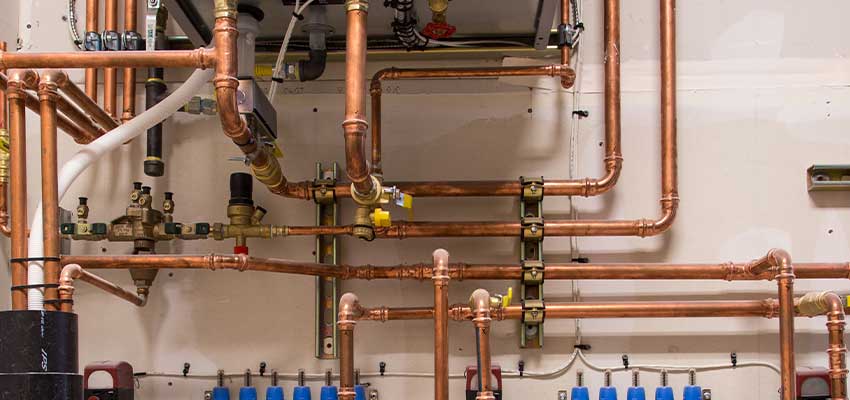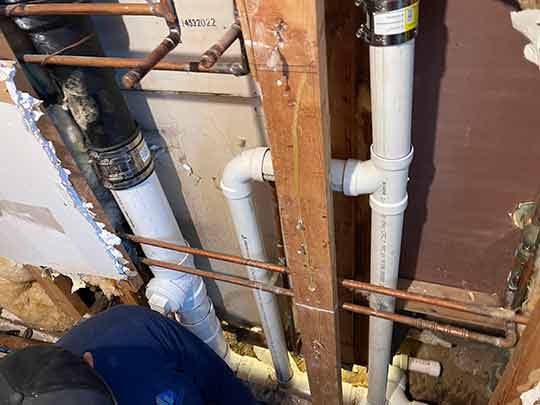Why Purchasing Repiping Services Is Important for Your Home's Plumbing Wellness
Repiping services play an essential function in maintaining a home's pipes health. With time, pipes can corrode, leak, or come to be blocked, leading to possible risks and inadequacies. Property owners often ignore the indications of degrading pipes, which can cause significant damages. Recognizing the requirement for repiping is vital. What aspects should homeowners take into consideration before making this financial investment? The answers might surprise you.
Comprehending the Relevance of Repiping
While numerous homeowners may forget the importance of repiping, it plays a crucial function in maintaining the general health of a pipes system. With time, pipelines can wear away, create leaks, or end up being obstructed with mineral down payments, causing minimized water quality and flow pressure. Repiping addresses these issues by replacing old, broken pipes with brand-new, resilient materials, guaranteeing a reliable supply of water and decreasing the threat of pricey repairs related to leaks and water damages. Furthermore, contemporary piping products are frequently a lot more effective and eco-friendly, adding to reduced power prices and boosted water preservation. Performing a repiping job can boost a home's resale value, making it a sensible investment for property owners. Inevitably, identifying the value of repiping permits home owners to take aggressive measures in guarding their pipes systems and ensuring a safe, functional living atmosphere for their families.
Common Signs That Suggest the Requirement for Repiping
House owners should be alert for sure indicators that indicate the demand for repiping, as disregarding these concerns can cause more serious pipes problems. One usual indicator is the visibility of regular leaks, which can recommend aging or wearing away pipes. Additionally, an obvious decrease in water pressure may show obstructions or corrosion within the pipes system. Home owners may also discover tarnished or rusty water, signifying pipe deterioration. Unexplained water costs that are markedly more than common can also mean leakages hidden within the wall surfaces. The growth of mold or mold in locations near plumbing fixtures can recommend wetness concerns stemming from damaged pipes. If the home has old galvanized piping, it may be time to believe about repiping, as this material is prone to corrosion and rust. Identifying these signs early can help maintain a healthy plumbing system.
The Threats of Neglecting Pipes Issues
Overlooking plumbing problems can lead to substantial water damage, which might endanger the architectural stability of a home. In addition, unsolved leakages can develop a setting for mold growth, posturing serious carcinogen to residents. Attending to pipes issues without delay is necessary to guard both home and health.
Water Damages Concerns
When plumbing issues go unaddressed, the threat of water damages rises considerably. Leakages, leaks, and fractures in pipelines can bring about considerable water breach, endangering the architectural stability of a home. Gradually, also small leakages can cause rot, mold and mildew growth, and damage to wall surfaces and floor covering, causing expensive repair services. Water damage can additionally affect electric systems, developing harmful problems. Property owners frequently underestimate the cumulative influence of small leakages, which can lead to extensive damage otherwise quickly addressed. Disregarding plumbing concerns not only enhances the probability of prompt damage but can additionally reduce residential property worth and position long-term monetary worries. Because of this, timely repiping solutions are necessary to protect against water damage and preserve a healthy home atmosphere.
Wellness Hazards Increase
Unsettled pipes problems can result in considerable health threats within a home. Contaminated water from rusty pipelines can introduce hazardous microorganisms and lead to serious diseases. Mold development, frequently a result of leaks and excess dampness, presents respiratory threats and can set off sensitive reactions. Additionally, stagnant water can bring in pests such as pests and rodents, which carry illness that better endanger family health and wellness. Overlooking these pipes troubles not just compromises the safety and security of homeowners however can likewise lessen residential property worth. Consequently, resolving pipes problems with repiping solutions is important. Prompt treatment not just safeguards health and wellness yet likewise ensures a risk-free living atmosphere, avoiding extra considerable damages and expensive fixings down the line.
Various Kinds of Piping Materials
Piping materials are a crucial part in pipes systems, affecting durability, efficiency, and total efficiency. Numerous alternatives are offered, each with distinct residential properties and applications. Copper piping is recognized for its long life and resistance to deterioration, making it a click here prominent option for both cold and hot water lines. PVC (polyvinyl chloride) is lightweight, affordable, and immune to chemical damages, mainly utilized for drainpipe and vent systems. PEX (cross-linked polyethylene) has actually gotten appeal as a result of its flexibility and convenience of installation, permitting fewer joints and possible leak points. Galvanized steel, though as soon as typical, is less beneficial today because of its vulnerability to rust and lowered water circulation in time. Each material offers unique advantages and disadvantages, making it crucial for property owners to speak with plumbing specialists to establish the most ideal alternative for their certain requirements and conditions. Choosing the best piping material can greatly affect the effectiveness and security of a pipes system.
The Repiping Process: What to Anticipate
The repiping process starts with a comprehensive analysis of the existing pipes to recognize issues and determine the very best strategy. Following this assessment, home owners will certainly need to choose ideal replacement materials that suit their plumbing requires. A summary of the installment procedure will certainly provide insights right into what to expect throughout this substantial home improvement.
Assessment of Existing Pipes
A precise analysis of existing pipelines is essential for guaranteeing the long-term health and wellness of a pipes system. This examination includes examining the materials, age, and condition of the pipes, as well as identifying any signs of corrosion, leaks, or blockages - Houston Repiping Experts. Specialist plumbing professionals frequently use advanced strategies such as video clip evaluations to acquire a clear sight of the pipeline's inside without intrusive treatments. By determining problem areas early, property owners can avoid further damage and costly repair work in the future. Furthermore, understanding the existing state of the pipes facilities aids in making educated decisions pertaining to required upgrades or repiping. Overall, a thorough evaluation acts as the foundation for an effective repiping process, guaranteeing that the new system meets the home's particular needs
Selecting Substitute Products
After assessing the existing pipes, property owners encounter the vital decision of picking proper substitute materials for their pipes system. Typical options include copper, PVC, PEX, and CPVC, each with distinct advantages and negative aspects. Copper is known for its longevity and resistance to deterioration, making it a long-lasting selection. PVC is cost-efficient and lightweight, appropriate for drainpipe and vent lines. PEX offers flexibility and is resistant to range and chlorine, making installation less complicated in limited spaces. CPVC resembles PVC yet can withstand higher temperatures. Homeowners have to take into consideration factors such as budget plan, local building ordinance, and the certain needs of their plumbing system when making this choice, guaranteeing excellent efficiency and longevity for their home's pipes infrastructure.
Setup Refine Review
Repiping a home can be click here a substantial endeavor, however comprehending the setup procedure helps homeowners get ready for what exists ahead. The procedure commonly begins with a thorough evaluation of the existing plumbing system to determine trouble locations. Next off, a thorough strategy is formulated, detailing the necessary materials and timelines. On the installation day, professionals will certainly typically start by shutting down the water supply and draining the existing pipes. They then get rid of the old piping, which might include opening walls or ceilings for gain access to. New pipelines are mounted, ensuring they satisfy existing plumbing codes. The system is evaluated for leaks, and any openings are repaired. House owners can anticipate a efficient and clean procedure, decreasing disturbance to their every day lives.
Long-Term Benefits of Repiping Your Home
While many homeowners might ignore the significance of upgrading their plumbing, the long-term advantages of repiping a home can considerably improve both its worth and performance. Among the main advantages is enhanced water quality. Older pipelines might nurture pollutants and corrosion, while new piping warranties risk-free and tidy water delivery. Furthermore, repiping can bring about increased water pressure, making everyday jobs more reliable.

How to Select the Right Plumbing Solution for Repiping
How can house owners ensure they choose the very best plumbing solution click here for repiping? They must look into local pipes business, focusing on those that specialize in repiping solutions. Houston Repipe Specialists. Reading on the internet evaluations and endorsements can give understandings into the quality of solution used. It's essential to look for proper licensing and insurance coverage, guaranteeing the chosen business complies with local guidelines
Home owners should likewise ask for thorough quotes from numerous companies to contrast rates and services used. Involving straight with possible plumbings can assist assess their knowledge, interaction skills, and willingness to answer questions. Additionally, requesting references from previous customers can confirm a firm's reliability and workmanship.
Finally, house owners ought to think about the firm's warranty plans on products and labor, as this can reflect their commitment to top quality. By adhering to these guidelines, property owners can make an enlightened choice, guarding their pipes health via efficient repiping solutions.
Regularly Asked Inquiries
How Long Does a Normal Repiping Job Require To Total?
A common repiping project typically takes between one to 5 days to finish, depending on the dimension of the home and intricacy of the pipes system. Correct planning and specialist proficiency can affect general duration significantly.
Will Repiping Increase My Home's Resale Worth?
Repiping commonly enhances a home's resale worth, as prospective buyers value updated pipes systems. This enhancement lowers prospective plumbing concerns, making the property a lot more attractive and possibly validating a greater asking cost during sale settlements.
Can I Remain In My Home Throughout Repiping?
Throughout repiping, remaining in the home is usually possible, yet it may depend upon the level of the job. House owners should get ready for short-lived disruptions and talk to contractors for certain setups and safety and security factors to consider.
What Is the Average Cost of Repiping a Home?
The average price of repiping a home commonly varies from $4,000 to $15,000, depending upon factors such as the dimension of your house, materials used, and labor prices connected with the pipes work. - Houston Repipe Specialists
Do I Required a License for Repiping Providers?
A permit is generally required for repiping services, as it assures compliance with local building ordinance and guidelines. House owners ought to consult their local authority or a certified plumber to figure out specific permitting demands for their area.
